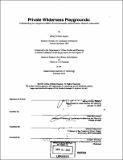Private wilderness playgrounds : understanding the competitive effects of environmentally oriented master-planned communities
Author(s)
Rapson, Jeffrey William, 1971-
DownloadFull printable version (42.15Mb)
Other Contributors
Massachusetts Institute of Technology. Dept. of Urban Studies and Planning.
Advisor
Eran Ben-Joseph.
Terms of use
Metadata
Show full item recordAbstract
The thesis of this work is to better understand the competitive effects of developing second-home master-planned communities in an environmentally oriented fashion. The competitive effects, are understood by examining the "traditional" land development approach and comparing it to the approach used in two case studies in this research-Spring Island and Dewees island. These measurements and comparisons are used to understand and nform the effectiveness of an environmentally-oriented development approach, whereby these development strategies can be put forth and adopted as an approach to create value in future residential developments. The study derives its information from personal interviews and secondary research on the two developments. The research then presents a comprehensive synopsis of the competitive strategies so that the subtle relationships between consumer preferences, development risks, and market feasibility can be better understood. This thesis is intended to better inform community developers of the benefits, financial and otherwise, that one can capture through a whole-systems approach to master-planned community development. A whole-systems approach to residential development is defined by taking the three primary drivers for decision-making, economics, community and environment, and actively considering the interconnections between the systems in a balanced orientation. This concept is often referred to as the 'solutions multiplier' effect. This thesis finds that residential community developers in the South Carolina Low Country secondhome market can generate significant premiums and differentiate their communities in a highly competitive marketplace, while making better decisions that are more responsive to a project's social, aesthetic, environmental, and economic site through a whole-systems market-based development approach. It will be shown that bringing these three primary drivers together and capitalizing on their interconnections has realized multiple benefits over their competition while creating a new community development prototype.
Description
Thesis (S.M. and M.C.P.)--Massachusetts Institute of Technology, Dept. of Urban Studies and Planning, 2002. Includes bibliographical references (p. 175-178).
Date issued
2002Department
Massachusetts Institute of Technology. Department of Urban Studies and PlanningPublisher
Massachusetts Institute of Technology
Keywords
Urban Studies and Planning.